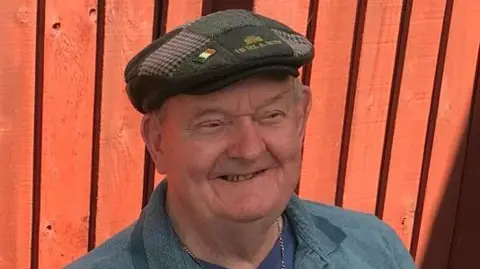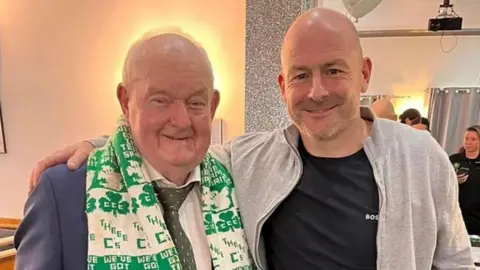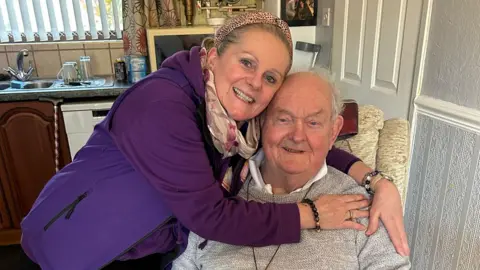Anger at wait for grandfather's body in mortuary
 Family
FamilyThe family of a grandfather whose body was left in a mortuary for 18 days have said they were traumatised by the experience.
Arthur Farrell, 89, died peacefully at Heartlands Hospital in Birmingham on 27 January, but his death was potentially asbestos-related and his body had to be examined.
Relatives told the BBC a shortage of pathologists led to a two-and-a-half-week wait to get his body back and a delay in burying him.
The government said it was determined to reduce any delays grieving families may face when laying loved ones to rest.
Arthur's daughter Teresa Farrell, a community worker who runs a social enterprise in Chelmsley Wood, Solihull, urged government action.
She said the situation was especially upsetting as her Irish family's tradition was to lay relatives to rest as soon as possible.
"No one is taught to grieve but when you have to wait for your loved one's body it shouldn't be like that," Ms Farrell said.
"We shouldn't be suffering like this. No family should."
 Family
FamilyThe grieving daughter said Mr Farrell, a former factory worker, was a pillar of the community and well known in his area.
The father, who left behind eight children, 16 grandchildren and 24 great grandchildren, was a founder member of Chelmsley Wood's grassroots Catholic Community Centre Football Club.
 Family
FamilyAccording to the NHS, a post-mortem should be carried out as soon as possible, and usually within two to three days.
They are conducted privately, with councils and coroners hiring pathologists on a freelance basis.
But pathologists complete a wide range of medical tasks and Covid pandemic cancer backlogs mean many have so much NHS work that they don't have the time to do private work on top.
 Family
FamilyMs Farrell said she was saddened ministers had not identified the issue years after the pandemic.
She urged the government to call up retired pathologists to help with backlogs.
"It was a horrendous time," she said. "It was worse than having him pass.
"God knows how many bodies and families are waiting. We need closure straight away so we can move on with life."
The family still don't know Mr Farrell's exact cause of death three months after his passing.
'Fragmented and disjointed'
Professor Mike Osborn, the former president of the Royal College of Pathologists, agreed 18 days was a long time to wait.
But he said he had heard of families waiting even longer, including parents who were waiting to bury children.
“The College has raised concerns for many years about the unacceptable delays bereaved families face," he said.
"These delays often leave families experiencing a very poor service that is fragmented and disjointed."
A government spokesperson said: “We are determined to ease the burden on grieving families and reduce any delays they may face when laying loved ones to rest.
“This includes changing the law to make it faster and easier to establish a death is from natural causes without the need for a post-mortem, and reviewing pathologists’ pay.”
Follow BBC West Midlands on Facebook, X, and Instagram, Send your story ideas to: newsonline.westmidlands@bbc.co.uk
